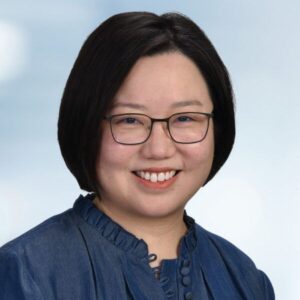Chia-Ling Phuah, MD, MMSc, is a neurointensivist and physician-scientist in the Neurocritical Care Program, and an associate professor in the Department of Neurology at Barrow Neurological Institute. She is a faculty member of the Human Neurosciences Program and co-director of the Barrow Neuro Analytics Center. She is board certified in neurology by the American Board of Psychiatry and Neurology and in neurocritical care by the United Council for Neurologic Subspecialties.
Dr. Phuah’s expertise is in human preclinical and translational research in cerebrovascular disease, brain health, and resilience after brain injury. She is a member of the American Academy of Neurology, the American Heart Association, the American Neurological Association, the Neurocritical Care Society, the Society of Critical Care Medicine, and the International Stroke Genetics Consortium.
Dr. Phuah earned her medical degree from the University of Cambridge in the United Kingdom (UK) and a Master of Medical Sciences degree from Harvard University in Boston, Massachusetts. She completed her neurology residency and fellowship in neurocritical care at Massachusetts General and Brigham & Women’s Hospital through the Harvard Medical School Partners Program. She also completed a two-year postdoctoral fellowship in stroke and analytic genetics at the MGH Center for Genomic Medicine and Broad Institute of MIT and Harvard.
Dr. Phuah engages in research at the convergence of quantitative neuroimaging, genomics, and bioinformatics. Through the utilization of big-data and computational methods, she investigates the intricate biological mechanisms associated with brain aging and resilience to neurological disorders including cerebral small vessel disease, stroke, and Alzheimer’s disease. Her overarching objective is to pinpoint pivotal targets for future therapies and implement precision strategies for both prevention and recovery. She is the recipient of numerous awards from the National Institutes of Health (NIH) and other foundations in support of her research. She is a strong proponent of collaborative science, working closely together with multi-disciplinary partners and multicenter research consortia across the world.


